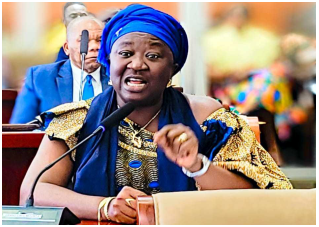‘No Standard Laboratory To Test Medical Products’ -Senate Committee Recommends Support To LMHRA
By Bill W. Cooper
The Liberian Senate Committee on Health has established that the influx of substandard medicines on the Liberian market is due to the lack of a standardized testing laboratory in the country.
The committee’s Chairperson, Senator Dabah Varpilah disclosed that the Liberia Medical and Health Regulatory Authority (LMHRA) does not have up-to-date laboratories to do testing of medicines brought or being produced in Liberia, posing serious health hazard to the citizenry.
The Grand Cape Mount County Senator made the disclosure over the weekend, during their regular sitting, when she briefed her colleagues on decision taken by the LMHRA to provide a manufacturing license to the Global Pharmaceuticals Company in Liberia.
The Global Pharmaceuticals Company, situated in the township of Caldwell Road on the Bushrod Island, is owned by Ukraine Honorary Consul General to Liberia Nelson Oniyama who is also the General Manager of the Monrovia Breweries Incorporated.
In 2022, the Government through the LMHRA issued a license to the Company to manufacture about 13 medical products in Liberia with tax incentives but there have been concerns over the quality of the medicines that are being produced by the company.
But briefing to the Senate following an ongoing investigation conducted by the committee, Sen. Varpilah stated that authorities of the agency have claimed that the lack of adequate budgetary support from the government is responsible for the situation which if not addressed could affect majority of the citizenry.
The LMHRA is the statutory arm of the government with responsibility to ensure that all medicines and health products circulating the borders of Liberia are safe and efficacious.
The LMHRA was established on 29 September 2010, based on provisions of the National Drug Policy for the establishment of a Medicines Regulatory Authority to enact and update medicines regulations to regulate the Pharmaceutical Sector, and establishment of a national quality control laboratory under the Authority.
According to the senator, it was also observed that the lack of up-to-date laboratories is preventing the LMHRA from thoroughly carrying out inspections on the importation and production of medicines and other health products in Liberia.
“Their inspections are not being carried out in the way that they would like to, and working with Global Pharmaceuticals, the LMHRA used a third-party laboratory in Ghana to test the medicines that they were producing and based on the results, they issued them their license and certificate to produce the 13 different medications.
“The LMHRA told us that they do not have the authority to provide or grant monopoly or restriction on anything that comes in the market; their role is strictly limited to testing for quality and ensuring that the right medications are brought into the country,” she noted.
Sen. Varpilah further indicated they also did not speak to Global Pharmaceuticals’ capacity to produce the quantity of those specific medicines to meet the demand of the country but underscored the need for proper support to the LMHRA.
She explained that the agency would effectively and efficiently carry on its assigned tasks and responsibilities if it is sufficiently supported by the government, stressing that the agency will be able to track substandard drugs if its inspection and testing capabilities are improved.
The Grand Cape Mount County Senator intoned that medicines being imported and produced in the country must be thoroughly tested multiple times to guarantee the safety of consumers across the country.
“There should be over time inspection and testing to ensure that the strength and quality of the medicines being produced are still in tight. The LMHRA should be supported so that they can have a laboratory or contract third-party testing to further test the 13 products that were licensed to Global Pharmaceuticals,” the committee recommended.
The senator mentioned that the company commenced production of the medicines early this year, and a huge consignment of over 1.3 million worth of materials were brought into the country.
“In our exchanges with them, we realized that the LMHRA’s functional limitation is actually not doing real laboratory tests of medicines imported in the country, doing physical observation and issuing partners,” she added.
Sen. Varpilah then called for urgent action to address the issue and said, “We cannot afford to continue to put the health of our people at risk and as such, we must invest in the necessary laboratory infrastructure to ensure that all medical products in Liberia are safe and effective.”

